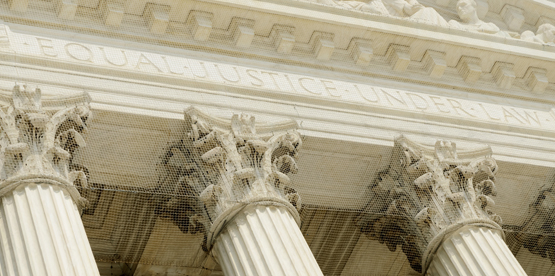A&B ABstract: In a reversal of its previous position on the issue, the CFPB publicly asserted last month in two separate venues that the for-cause removal provision of the Consumer Financial Protection Act is unconstitutional.
On September 17, 2019, CFPB Director Kathleen Kraninger sent two letters (the “Letters”) to Speaker of the House Nancy Pelosi and Senate Majority Leader Mitch McConnell. In the Letters, Director Kraninger explained that the CFPB had about‑faced in its position on the constitutionality of what is known as the for-cause removal provision of the Consumer Financial Protection Act (“CFPA”). This provision permits the President to remove the Director of the CFPB, but only for cause. Previously, the CFPB defended this provision’s constitutionality. The CFPB now asserts that the provision is unconstitutional. Further, the CFPB has asserted this new position in a brief filed before the Supreme Court in response to a petition for certiorari filed in CFPB v. Seila Law, No. 19-7 (S. Ct.) (filed September 17, 2019) (the “Seila Law brief”).
CFPB v. Seila Law
In Seila Law, the Seila Law firm refused a CFPB civil investigative demand (“CID”). Seila Law asked the CFPB to set aside the demand under 12 U.S.C. § 5562(f) and 12 C.F.R. § 1080.6(e). The Director of the CFPB denied the request, and Seila Law submitted partial responses, reiterated its objections, and declined to provide further information or documents. The CFPB filed a petition to enforce the CID in federal district court and prevailed. Seila law appealed to the Ninth Circuit, which affirmed based primarily on the majority opinion from the D.C. Circuit en banc decision PHH Corp. v. CFPB, and then Seila Law filed its petition for certiorari. On September 17, 2019, the DOJ filed the Seila Law brief on behalf of the CFPB.
Various Positions Taken in Seila Law
In the Letters, Kraninger summarized the arguments made in the Seila Law brief and explained that she has “directed the Bureau’s attorneys to refrain from defending the for-cause removal provision in the lower courts.” Given this major concession regarding the constitutionality of the CFPB’s structure, it is unclear whether parties subject to CFPB investigation may successfully resist CFPB authority.
The CFPB has taken the position that “a Supreme Court decision holding that the for-cause removal provision is unconstitutional should not affect the Bureau’s ability to carry out its important mission [of consumer protection,” because “if the Court holds the for-cause removal provision unconstitutional, the CFPA should remain ‘fully operative’ and the Bureau would ‘continue to function as before, just with a Direct who ‘may be removed at will by the President.’” See Letters (quoting Free Enterprise Fund v. Public Co. Accounting Oversight Bd., 561 U.S. 477, 508 (2010)). As a result, even if the Supreme Court held that the for-cause removal provision was unconstitutional, Seila Law (and others) would still be required to respond to CFPB CIDs.
Others, however, have taken the position that if the provision is unconstitutional, then the CFPB’s authority is severely diminished. For example, the State of Texas’s amicus brief in Seila Law took the position that the for-cause removal provision renders the CFPB unconstitutional; as a result, there is no obligation for Seila Law to answer the CFPB’s CID. See Texas Amicus Br. at 16.
Takeaway
Despite the CFPB’s reversed position, it remains unclear whether the for-cause removal provision is unconstitutional, and if so, what affect that has on the CFPB’s authority. For now, we will be monitoring the case for developments, including to see if the Supreme Court will take the question.

